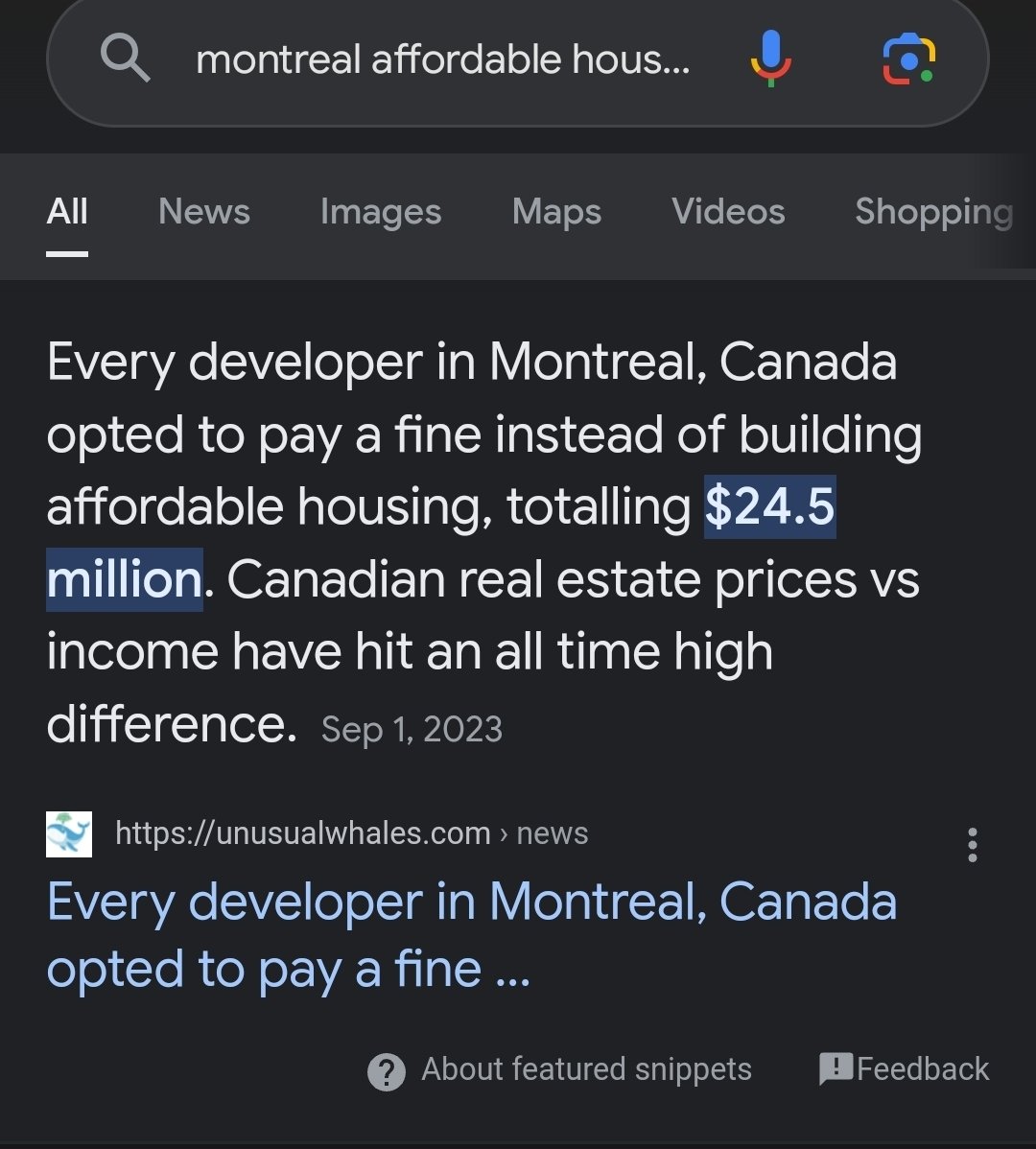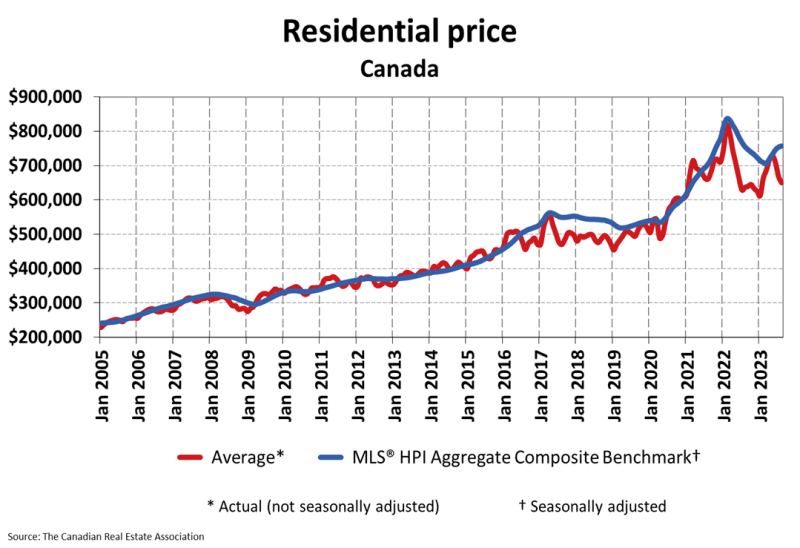Just a reminder that when given the choice of building afforable housing or paying a fine, every single developer in Montreal elected to pay a fine.
Developers. Can. Not. Be. Counted. On. To. Fix. The. Housing. Crisis.

How does the saying go? Something like For the rich, fines are just part of the cost of doing business
If the fine is less than the profit then it’s the cost of doing business
If the fine is tax-deductible, it’s even better!
This isn’t necessarily that bad, I think the city just wasn’t ready to step in and build them themselves with the funds.
Where’s the logic in that?
Houses are like cars. When you build an expensive house (or car) for someone who is rich, they leave a lower-cost used home (or car) behind, available to be filled by someone who is not so well off. The more ‘unaffordable’ homes you build, the more affordable homes come onto the market when the people leave their old home to move into the new home.
But the fine means that developers have to limit themselves to only the most profitable houses, which means the still pretty profitable houses, but not attractive enough once the fine is paid, go by the wayside. And, therefore, fewer affordable homes come onto the market.
Was council trying to make housing even less accessible?
deleted by creator
Reality: rich people are entering the market (via immigration or coming of age) without a house or already have expensive houses.
That is ultimately the same situation. If you don’t build them an ‘unaffordable’ house then they will outbid the poor for what otherwise would have been an affordable house, taking the affordable house away from someone of lesser means. These rich people are not going to go without a house.
It remains that fining developers for building houses is not going to incentivize developers to build more houses. Council recognized that the only way to get more affordable housing on the market is to build new houses, but then disincentivized the activity for some reason. It is like they wanted to make housing less accessible.
deleted by creator
If you only increase supply for the rich
Affordable housing only increases the supply for the rich. After all, if they are affordable, they are especially affordable for those who are rich. The only way to break out of that is to construct so many homes that the rich no longer want any more. Policies to scare developers away from building homes does not get you there.
Ah yes, trickle down house-enomics.
Not enough people say this, fuck Regan!
Regan? What? Are you struggling to spell (Will) Rogers? It is he who coined ‘trickle down economics’ – as a joke – and it was in reference to Hoover. Regan enters the picture nowhere. He has no connection to trickle down, housing in Montreal, or anything to do with Canada at all.
Ronald Reagan’s economic policies, dubbed “Reaganomics” by opponents, included large tax cuts and were characterized as trickle-down economics.
Characterized by who? Trickle down economics isn’t an actual thing, just a joke that made fun of Hoover’s engineering background making him familiar with water tricking down, but not realizing that money ‘trickles up’.
Trickle down economics was not a joke to Reagan (publicly anyway). His plan called for massive tax cuts to the rich so their growth would “trickle down” to everyone else through more jobs from business expansion.
A remarkably stupid idea that has only worked out for the rich…
Yes, of course! If we just build luxury housing for the rich, the rich will just vacate their current luxury housing (for the rich), which will open it up for someone else! Who will be able to afford luxury housing (for the rich).
This is the thinking of someone who’s never struggled to pay a bill in their life.
Houses are like cars. When you build an expensive house (or car) for someone who is rich, they leave a lower-cost used home (or car) behind, available to be filled by someone who is not so well off.
Except they hang on to the lower cost used home and rent it out at extortionate prices to help pay for the expensive house.
Removed by mod
Capitalism works for small market. It fails horribly for large market like housing. A small market where everyone can participate and compete is totally fine. Big market where you already need to be rich as fuck to do anything is the problem. We are more and more in big market. Every business domain is big. There is no place for smaller player anymore. No one can just build their home anywhere they like. You need specialized people and that’s a cost. Capitalism is totally fine when the market can be entered by anyone.
Capitalism does work for large markets, just not ones where the demand side of the market is structurally disadvantaged.
Distribution, logistics and warehousing are great for capitalism, for example. Healthcare and housing, though, very much are not.
You only need to be rich because of regulatory barriers, though.
Without such barriers, multiple people could buy a Toronto or Vancouver residential property (they’re needlessly huge) and build many Japanese style homes (if not something more dense) on the plot. All very affordable when divided up.
We just can’t do that because the government says “no”.
Greed ruins every economic system
Capitalism was supposed to avoid all the problems we face.
Removed by mod
Yes; under Mercantilism the nobles could sit around all day and their wealth would increase off the backs of the workers
Enter Capitalism where you no longer have generational wealth and pay is based on how many hours you put in. The goal is that the artisan will be the richest in society because they spend their life working
Or at least in theory; it fails when you add capitalists which just occupied the nobles branch before
I mean, are capitalists really added in? They’re baked in the system, from where I stand. How did it ever try to solve generational wealth, when wealth can be accumulated/inherited? When was it ever about wages, and not about profit incentives and private ownership of production? And is “spending your life working” the thing we want to encourage as a society?
If we change systems then people with wealth and power will erode it or seize the power vacuum created
Also you are correct in saying you can’t have a Capitalist nation with inheritance
A more recent example is Communism where every country that claims to adopt it doesn’t do that, instead they tend to adopt more authoritarian measures and centralized governments
Going back even further you can look at Christianity where people are supposed to be banned from having wealth but they needed to get the elite on board for it to spread
A more recent example is Communism where every country that claims to adopt it doesn’t do that
Huh? There is no country that has ever claimed to have adopted communism. The “Communist countries” are so-named because they are ruled by the Communist Party – similar to calling Canada a “Liberal country” because the Liberals hold power – not because they have actually achieved communism or believe they have achieved communism.
Those countries often claim that they are working towards post-scarcity (the precondition of communism), but that’s quite different.
Canada is considered a liberal country regardless of the party in power
This point of view always leaves me scratching my head. What’s the point, exactly? Are we genuinely arguing that we are not living in a capitalist society?
Are we genuinely arguing that we are not living in a capitalist society?
We live in a mixed economy. We do have private ownership of capital (capitalism), but we also have community ownership of capital (socialism).
Is that still a capitalist society? Formal definitions of “capitalist society” suggests to me that you must have a capitalism economy and also a government that I think most people here would call “libertarian”. That does not describe Canada.
The point is that you’re not going to get rid of the problems unless you get rid of the people that seek power
deleted by creator
That’s what happens when you treat housing like a speculative investment.
deleted by creator
Development… of housing. Play with definitions all you want, I still hold that this is what happens when you treat housing like a commodity. It’s a necessary part of the system, as a side effect of said system.
Tax fucking speculators like the tons of Canadians that continue to fuck over other Canadians.
Keep those prices high so low-density shit is phased out.
Now ensure it’s harder to insure a word building against fire.
Now give a tax break that encourages the recycling of land-hoarder bungalows into shared space with high-density housing. Tax break increases with proxity to rail transit.
Now increase property tax to penalize hoarded ornamental (not agricultural) land.
That’s a good start.
If this were happening under Poilievre instead of Trudeau then he would take away funding from municipalities. That would show these developers
I mean I hate Poilievre but he’s not wrong there. Municipalities are a big part of the reason they’re not building.
I follow my local municipal gov’t closely. They talk a good game about housing, but their actions speak louder. A developer wanted to build two huge towers on a parking lot, next to an existing huge tower of the same size. City staff said no, 39 storeys is too tall for the urban core of Hamilton, 4 storeys is too tall for a pedestal.
A charity wanted to convert an underused park into a tiny-home homeless shelter. City council said no.
Before the pandemic, developers wanted to sprawl out more suburbia. City council ran a referendum. The public said no.
Now, you can disagree with any of those three solutions – personally I strongly hate building more suburban sprawl. But if you block all 3, the evidence shows you just don’t want housing, regardless of what you say.
At every turn, municpal governments say “yes, we want more housing, but not this housing”.
Interest rates have jumped, which means buildings aren’t as profitable to make. The way to get back some of that profitability is to make them bigger. If a 10 storey building won’t best the cost of the loans taken to build it under the new lending conditions, a 20 storey building probably will. And the municipality says “no”.
I hate Poilievre. I care about trans people. I care about climate change. But he’s the only one talking about giving city governments the ball-busting they deserve.
He absolutely is wrong there; municipalities can’t reach housing targets if they only get funding after reaching them
He also wants those targets to increase by 15% every year
And having municipalities no longer able to support their current populations isn’t going to entice them to bring in more people
His housing plan also gets rid of transit because municipalities have to have an undisclosed (read the bill) amount of occupied high density housing at every stop. People use transit to get to work/stores/entertainment not to get from apartment block to apartment block
The whole point of his bill/policy is to have unreasonable asks so he can get rid of funding. I don’t think anyone is dumb enough to think it will accomplish anything
As for Hamilton the developer was told to amend their proposal but didn’t submit it until after the deadline
He absolutely is wrong there; municipalities can’t reach housing targets if they only get funding after reaching them
Municipalities can absolutely reach housing targets, they just have to stop saying “no” to infill developers. The Hamilton example is not spurious - the only reason it’s going through this multi-year delay is because the building is too tall and needs to get a variance for being too tall.
The concept of “too tall for downtown Hamilton” is absurd on its face. Cities should have amended their official plans years ago and streamlined approvals for large, high-density infill developments. They choose not to. So they must be forced to do so.
It’s not just reptilian amoral for-profit developers facing this, it’s the heroic affordable housing builders too. You’ll hear the same complaints from Housing Now TO and Jen Keesmaat.
Watch this video presentation at Toronto City Hall by Mark Richardson of Housing Now:
https://mastodon.social/@Pxtl/110300343308877005 (yes, that is my mastodon)
"$20 billion dollar intersection in Forest Hill; somebody said that should be a 7-storey and 70-unit building in 2018. How…where did that number come from? Somebody picked that number. Because it “conformed to the current planning policy for Forest Hill”
he explains it very clearly: the housing crisis is a self-inflicted wound caused by municipal governments. He and his org have an endless list of buildings they want to construct, and they’re being told “no” by city hall.
Want to increase units by 15% per year? Stop saying no.
I know it’s creepy to see somebody defend home-builders, since most developers are crooks. You know why most developers are crooks? Because municipal governments made building housing a crime.
Okay, let’s take Ford’s target of 1.5m over 10 years or 150 000 a year
Next year it would be 172500, followed by 198375, followed by 228131 and so on
As we know it’s illegal for municipalities to operate in the red. So how high are your property taxes going to be to accommodate that when the city loses funding to cover those costs because they don’t make it
A realistic solution for other levels of government to intervene would be to build housing on land that they own
Interest rate spikes killed a lot of projects, and municipal stonewalling keeps the developers riding a pretty thin edge of profitability. These are for-profit businesses, of course when the loan repayments are going to eliminate all profit, they’re going to back off on their plans.
Imagine you’re planning a building - you design a massively profitable but huge building, but then years of bickering with city hall shrinks the building and raises your carrying costs until it’s just a modest win. Still fine. You get the permits and then interest rates jump. Now if you go forwards, the project will be deep in the red. The city won’t let you go back to your original huge form of the project without another multi-year fight.
If you sit on it until interest rates go down again, you’re not building. If you get started on a new application for a more profitable building, you’re not building.
You don’t have to listen to the dead-eyed mobbed-up reptiles of the for-profit housing industry to see this, listen to progressive affordable housing builders like Jen Keesmaat or Housing Now TO and they’ll tell you the same thing.
As long as the price keeps falling,

Why would you develop new housing?
If a job paid $80,000 per year in 2022 and now only pays $65,000 per year, and is likely to only pay $50,000 by next year, are you going to be rushing to develop your skills in that field?
This is the best summary I could come up with:
Inflation and the Bank of Canada’s response to it, has been the main reason for the slowdown, according to David Macdonald, a senior economist with the Canadian Centre for Policy Alternatives (CCPA).
Canada could need upwards of 3.5 million new homes built by the end of the decade, according to Aled ab Iorwerth, deputy chief economist with the CMHC.
He says Canada is nowhere near on track to meet that goal, and that means most Canadians, particularly those in major cities, will continue to struggle to afford housing.
“It’s not only that the construction cost goes up, it’s not only that the rates are up, it’s not only that people can’t afford their daily food and shelter – it is the fact that the government has not figured out how to streamline the process (to approve developments).”
The federal government recently waived the GST/HST on the construction of rental housing in Canada, prompting some developers to say they would add thousands of units in the coming years.
But Shaun Hildebrand, president of Urbanation, a consulting and research firm that focuses on condo and rental markets in Ontario, disagrees.
The original article contains 819 words, the summary contains 188 words. Saved 77%. I’m a bot and I’m open source!
Unfortunate to see from the developers.
Developers costs go up if they try to make houses faster- increased labour costs by increased demands, plus decreased housing costs when they go to sell.
Why would they make homes faster?
Why would buyer king sell more burgers?






